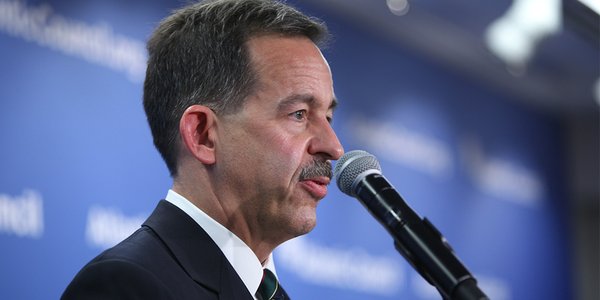 “Success in implementing the Iran deal not only makes the United States and its allies in the region safe but opens a host of other possibilities.” Speaking at the Atlantic Council and Iran Project Conference, “Implementing the Iran Nuclear Deal: What’s Next?”, The Honorable Stephen Mull, Lead Coordinator for Iran Nuclear Implementation at the US Department of State, iterated that the deal would dramatically scale back Iran’s nuclear program through measurable verifications by the International Atomic Energy Agency (IAEA).
“Success in implementing the Iran deal not only makes the United States and its allies in the region safe but opens a host of other possibilities.” Speaking at the Atlantic Council and Iran Project Conference, “Implementing the Iran Nuclear Deal: What’s Next?”, The Honorable Stephen Mull, Lead Coordinator for Iran Nuclear Implementation at the US Department of State, iterated that the deal would dramatically scale back Iran’s nuclear program through measurable verifications by the International Atomic Energy Agency (IAEA).
Mull stated that the Joint Comprehensive Plan of Action (JCPOA) focused on a singular issue: preventing Iran from obtaining a nuclear weapon. “The administration continues to engage Iran on other issues of concern and the deal does not indicate a softening of stance on regional destabilization, terrorism, human rights violations and the country’s missile program.” he stated.
https://www.youtube.com/watch?v=<a href="https://www.youtube.com/watch?v=cEjYKmYwmRk">https://www.youtube.com/watch?v=cEjYKmYwmRk</a>
Addressing concerns over Iran’s progress on implementation, Mull assured that any relief in sanctions would be initiated only after Iran’s adherence to its commitments of dismantling its uranium infrastructure. Progress towards implementation has been encouraging and it is expected that as much as “25,000 lbs. of enriched uranium may leave the country by the end of December.”
He contradicted popular belief of the deal being based on trust and reiterated that an intense verification of measurable determinants by IAEA will be the primary indicator to help both parties uphold their end of the deal. At the same time, United States will continue to engage its international partners for implementation.
Responding to a question about Israeli concerns over the deal, Mull ensured that regardless of the emotional debate on USIsrael relations, both countries “share a common strategic objective” to limit Iran’s ability to acquire nuclear weapons. Recently, encouraging signals have emerged from the Israeli government on working with the United States and its partners.
Mull expressed concern over the missile tests by Iran in October and reaffirmed American conviction that it violated UN Security council resolution 1929. US Ambassador to the UN, Samantha Power, called on the Security Council to exact penalties on Iran due to the violation. He also confirmed that the nuclear deal does not imply a softening of stance on other withstanding issues with Iran.
Rejecting the notion of a rift between Gulf Cooperation Council (GCC) members and the US over the deal, Mull maintained that though there were reservations over American engagement with Iran, the GCC did see it as a step forward towards regional stability. He renewed US commitment of showing sensitivity to the security need of its allies in the Gulf and assured that it would continue to bolster it in the future as well.
The ambassador also restated his confidence in IAEA’s professionalism in conducting inspections to verify Iran’s observance of its commitment to deal said that the United States had a long history of cooperation with the IAEA built on confidence in its professional capabilities. In the end, ‘it is a gamble’ and it is too early to tell what political results good faith can produce.
